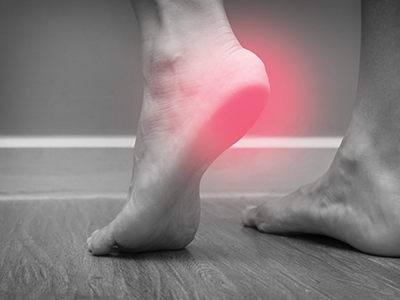Physio For Heel Pain – Plantar Fasciitis

Heel pain is commonly caused by a condition called plantar fasciitis (also sometimes called plantar fasciopathy). It is an overuse condition caused by inflammation of the plantar fascia, which is the tendon that supports the arch of the foot. There are many potential risk factors including having a job that requires a lot of walking or standing, tightness in the calf muscles, poor foot mechanics or inappropriate footwear. A big change in your activity levels can also contribute to plantar heel pain, such as a significant increase in the amount of running or walking that you do, or running on new surfaces or with new shoes.
What Is The Plantar Fascia?
The plantar fascia is a tough, fibrous band of tissue (fascia) connecting your heel bone (calcaneus) to the base of your toes. As the normal foot has an arch, the plantar fascia is at the base of the arch and acts like a bowstring to help maintain the arc of the foot. Repeated trauma to the tissue where the plantar fascia attaches to the heel bone can result in microscopic tearing at this attachment, called microtrauma. The most common cause of over-stressing the plantar fascia is due to having a degree of ‘flat foot’, called excessive pronation. As the foot drops into this flattened position, the joints in the middle of the foot are ‘unlocked’, allowing them to move freely and therefore rely more on the fascia to control the foot position.
Where Is Plantar Fasciitis Heel Pain Felt?
Plantar heel pain typically starts as a dull, intermittent pain on the bottom of your heel, and may progress to very sharp, constant pain. A common complaint is piercing heel pain with the first few steps in the morning and heel pain when walking or standing for long periods. It can become very severe, preventing any significant running, walking or jumping activities.
Treatment For Plantar Fasciitis Heel Pain
After completing a thorough assessment, your physiotherapist will discuss your diagnosis with you and outline the treatment plan for your injury. Recovering from plantar heel pain usually includes these major phases:
- Optimise and control pain/inflammation
- Correcting biomechanics
- Restoring range of motion and specific strengthening
- Sport specific and advanced strengthening
If plantar fasciitis heel pain goes untreated it can develop into a chronic and annoying condition. You are usually not able to keep up with activities such as running, long walks or other weightbearing sports. You may also develop hip, knee, or back problems because of limping and compensatory movements.
Resting from aggravating activities like running will often help temporarily settle your symptoms. However, if the biomechanical factors causing the problem are not addressed, it is highly likely that your heel pain will come back if you try to restart more walking, running or weight-bearing sports activities.
The majority of plantar fasciitis cases will respond well to physiotherapy and/or orthotics, however the recovery time will vary from client to client (anywhere from 6 weeks to 6 months). Initial treatment focuses on pain relief and correcting your foot position using either orthotics or tape, then progresses to a more strength-based focus as you improve. Your physio will guide you through a graded return to running or other sporting activities to ensure that you don’t re-aggravate your pain, and ensure that you had regained all of your strength and control to minimise your risk of future problems.


